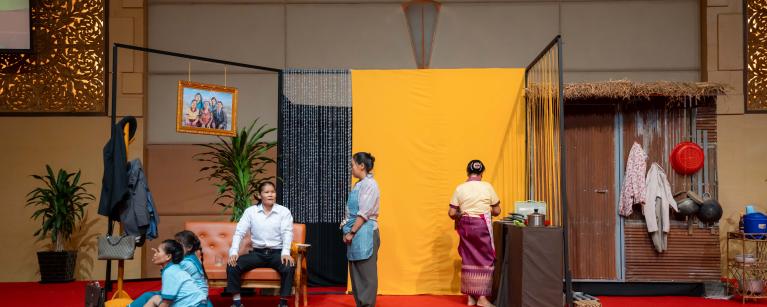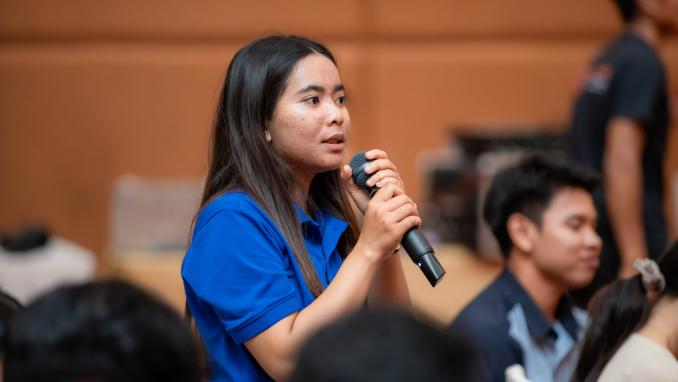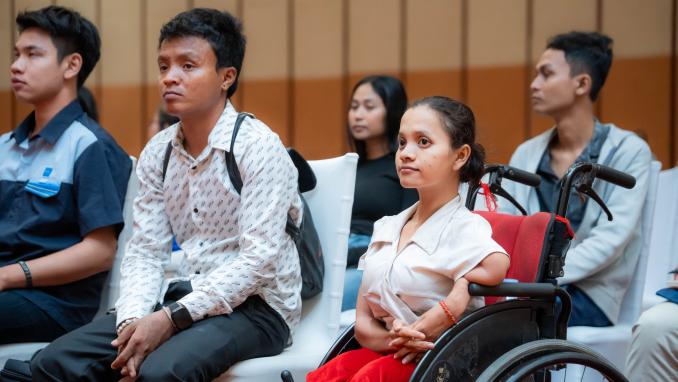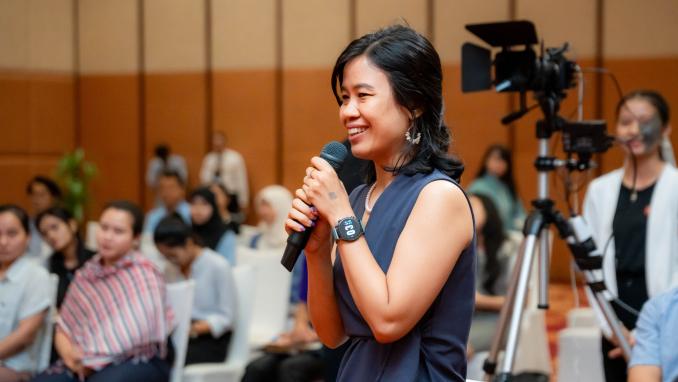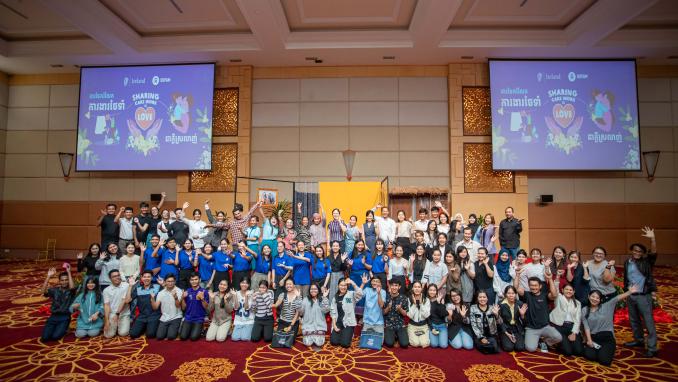In Cambodia, both paid and unpaid domestic work is often invisible, yet it is a lifeline for thousands of families. Women shoulder the disproportionate responsibility of running households, raising children, and caring for aging family members, often for low or no pay, without legal protection, and under social stigmatization.
For Channy Ang, a 32-year-old former domestic worker from Battambang province the work is physically and emotionally draining: “I worked as a domestic worker for nine months, losing five kilograms from working morning till night. I had no contract and knew nothing about the National Social Security Fund (NSSF). Promises of a pay raise took months to materialize.”
Chany’s story is a reflection of a broader societal issue. Traditional values in Cambodia often prioritize sons over daughters, confining women to household duties while men pursue higher education and careers. This unequal dynamic perpetuates the misconception that caregiving and domestic responsibilities are “women’s work.” Channy believes that men often lack understanding of the domestic duties and childcare responsibilities women handle. She feels that almost all men are ignorant of women’s labor. This issue, she says, stems from beliefs and traditions that value men and boys over women and girls and are passed down from one generation to the next.
“Men should share household responsibilities, even after a long day at the office, to ensure family harmony,” Channy added.
Channy found an opportunity to share her story through an Oxfam-organized forum theater play. The highlight was her participation in the theatrical performance “Who Will Care? A Story of Unpaid Caregivers,” developed and produced by Lakhon Komnit Organization (LKO). For the first time, she performed on a big stage in Phnom Penh, after spending ten days rehearsing in Battambang with LKO. The event offered a platform for women like her to voice their experiences and challenges as unpaid caregivers or domestic workers, who are often overlooked in society.
After the performance the participants were invited to share their thoughts about the meaning of the play. Channy was inspired by the fact that the majority of young participants, both men and women, understood and acknowledged the challenges of unpaid care and domestic work. This gave her hope and motivated her to advocate for more performances and to publicize these stories to the people across Cambodia.
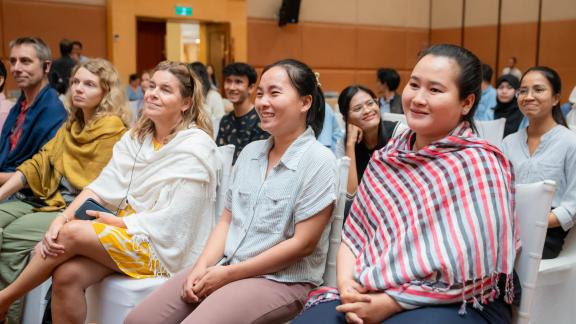
Audiences during the theoretical performance on Who will care? Photo: Oxfam
The performance was organized by Oxfam in collaboration with LKO to raise awareness about the authentic realities of unpaid care and domestic workload and to stimulate reflections and discussions about recognizing, valuing and sharing domestic contributions of women and girls at home.
The challenges faced by domestic workers like Channy are part of a global issue highlighting the unfair and disproportionate distribution of unpaid care and domestic work between men and women. In Cambodia, based on a 2004 national survey conducted by the National Institute of Statistic, women allocated a significant 188 minutes daily to care work, in stark contrast to their male counterparts who contribute only 18 minutes. Many women are trapped in informal economy roles, including domestic, casual, and care work. This dynamic has far-reaching consequences, hindering women’s education, limiting skill growth, and marginalizing their presence in public domains. These patterns support occupational divides, the ongoing gender wage gap, and the underrepresentation of women in leadership positions.
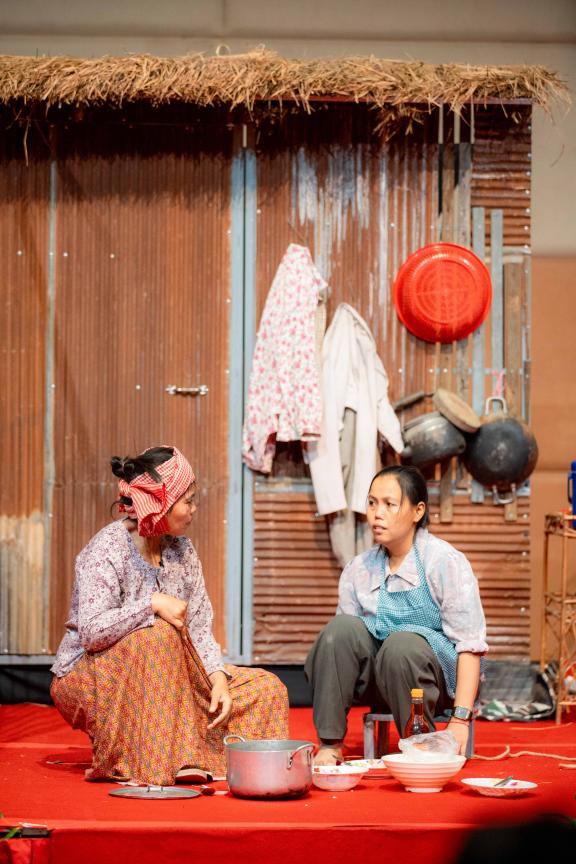
Channy (far right) who performed as the fictional character Phalla listens to Phalla’s mother exhaustedly after working the whole day. In the scene, Phalla’s mother tells her it is her duty to cook, clean, keep the house tidy, and prepare her husband’s meal for the family’s happiness. Photo: Oxfam
Adding to the challenge is the lack of reliable data regarding UCDW, which contributes to uncertainty over informed policymaking and productive investment.
Channy’s journey highlights the silent struggles of domestic workers and the need for greater recognition and support for their rights and contributions. Domestic workers and unpaid caregivers play a crucial role in maintaining the fabric of society, yet their efforts often go unnoticed and unappreciated. The lack of legal protection and social security leaves them, mostly women and girls, vulnerable to exploitation and abuse.
Channy’s story is a call to action for better working conditions and legal protections for domestic workers and recognition of unpaid contributions by women to the country’s economy and wellbeing. By sharing her experiences through fictional stories and performing arts, Channy hopes to inspire change and encourage others to recognize and support the invaluable work of domestic workers and unpaid women and girls at home.
